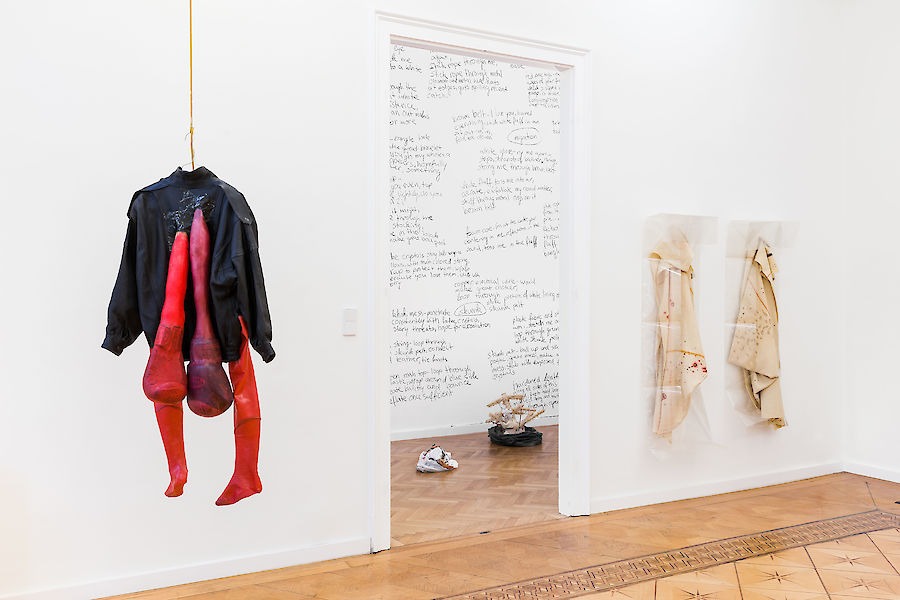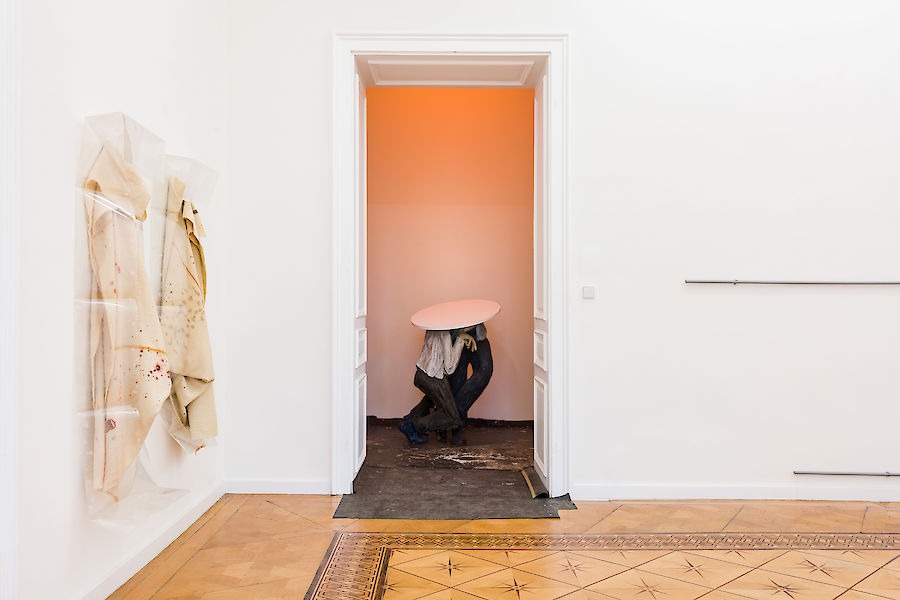Kreislaufprobleme
Kreislaufprobleme
13 Sep - 12 Oct 2019
KREISLAUFPROBLEME
Leda Bourgogne, Liz Craft, Liz Magor, Stuart Middleton, Ser Serpas, Angharad Williams
13 September – 12 October 2019
Curated by Anna Gritz as part of 'curated by' - the gallery festival with international curators in Vienna.
The severity of some consequences can take us by surprise, as Rita Valencia’s protagonist learns the hard way in the short story “Indecency”. She knew right away that something irreversible had occurred when she erroneously uses the word “bag” in place of the word “back,” an error that she calls “a leak of rotten soul juice,” a carelessness that condemns her to live her slip of the tongue. “Bag — back — back— bag. It was impossible to escape the unbearable significance of the transposition. My back would henceforth be a bag.”(1) A hollow container, with no shape of its own, but easily malleable by the contours of its load. A back bag cluttered by the disarray that is caused by the lack of a spine. Left with a weak, thin, malleable, leaking receptacle in place of what had provided her with strength and support – burden had become her backbone.
The self-determining if not predictive qualities of language area all encompassing. Word-finding appears to be world-creating not just in Valencia’s case. The poet Jack Spicer’s final words were “my vocabulary did this to me,” expressing so luridly the interdependency of our language and our lives. Valencia’s aforementioned slip of the tongue reads like a mistranslation of data that reprograms the world like a bug in a computer program. Yet the slippage appears to be not entirely random, much like a Freudian one, it reveals a long-standing affliction that has been quavering, repressed and then released by a sudden gush of rotten soul juice. Valencia calls it indecency, but I wonder if it is not much more a form of transparency?
Yet, the bag lady does not have to be as spineless as Valencia’s substitution suggests. Stuart M. mentioned Ursula Le Guin to me – her ‘Carrier Bag Theory’ identifying the bag as the first cultural device, a Palaeolithic recipient, “the thing to put things in, the container for the thing contained,” for collecting seeds, roots, sprouts, shoots, leaves, nuts, berries, fruits, and grains opposed to the standing narrative of the primacy of “the sticks and spears and swords, the things to bash and poke and hit with.” (2) And with this simple gesture Le Guin restored women’s loyalty to civilization while giving the novel a new shape, just that of a carrier bag, holding words and people instead of heroes.
What we find in the gallery is a selection of art works that speaks to Valencia’s slippage and to Le Guin’s carrier bag, to mistranslations, circulation problems, and language, the body and everyday objects. We see bodies-cum-objects shaped in pain by socio-economic conditions, language vignettes formed by-while conditioning found objects, word bubbles, mutated backs and carrier bags by Leda Bourgogne, Liz Craft, Stuart Middleton, Liz Magor, Ser Serpas, Angharad Williams.
Anna Gritz
(1) Rita Valencia: „Indecency“, in: Catherine Gudis (Hg.): Helter Skelter: L.A. Art in the 1990s, The Museum of Contemporary Art, Los Angeles, CA, 1992.
(2) Ursula K. Le Guin: „The Carrier Bag Theory of Fiction“, in: Dancing at the Edge of the World: Thoughts on Words, Women, Places, Grove Press, NY, 1989, S. 168 – 169.
Leda Bourgogne, Liz Craft, Liz Magor, Stuart Middleton, Ser Serpas, Angharad Williams
13 September – 12 October 2019
Curated by Anna Gritz as part of 'curated by' - the gallery festival with international curators in Vienna.
The severity of some consequences can take us by surprise, as Rita Valencia’s protagonist learns the hard way in the short story “Indecency”. She knew right away that something irreversible had occurred when she erroneously uses the word “bag” in place of the word “back,” an error that she calls “a leak of rotten soul juice,” a carelessness that condemns her to live her slip of the tongue. “Bag — back — back— bag. It was impossible to escape the unbearable significance of the transposition. My back would henceforth be a bag.”(1) A hollow container, with no shape of its own, but easily malleable by the contours of its load. A back bag cluttered by the disarray that is caused by the lack of a spine. Left with a weak, thin, malleable, leaking receptacle in place of what had provided her with strength and support – burden had become her backbone.
The self-determining if not predictive qualities of language area all encompassing. Word-finding appears to be world-creating not just in Valencia’s case. The poet Jack Spicer’s final words were “my vocabulary did this to me,” expressing so luridly the interdependency of our language and our lives. Valencia’s aforementioned slip of the tongue reads like a mistranslation of data that reprograms the world like a bug in a computer program. Yet the slippage appears to be not entirely random, much like a Freudian one, it reveals a long-standing affliction that has been quavering, repressed and then released by a sudden gush of rotten soul juice. Valencia calls it indecency, but I wonder if it is not much more a form of transparency?
Yet, the bag lady does not have to be as spineless as Valencia’s substitution suggests. Stuart M. mentioned Ursula Le Guin to me – her ‘Carrier Bag Theory’ identifying the bag as the first cultural device, a Palaeolithic recipient, “the thing to put things in, the container for the thing contained,” for collecting seeds, roots, sprouts, shoots, leaves, nuts, berries, fruits, and grains opposed to the standing narrative of the primacy of “the sticks and spears and swords, the things to bash and poke and hit with.” (2) And with this simple gesture Le Guin restored women’s loyalty to civilization while giving the novel a new shape, just that of a carrier bag, holding words and people instead of heroes.
What we find in the gallery is a selection of art works that speaks to Valencia’s slippage and to Le Guin’s carrier bag, to mistranslations, circulation problems, and language, the body and everyday objects. We see bodies-cum-objects shaped in pain by socio-economic conditions, language vignettes formed by-while conditioning found objects, word bubbles, mutated backs and carrier bags by Leda Bourgogne, Liz Craft, Stuart Middleton, Liz Magor, Ser Serpas, Angharad Williams.
Anna Gritz
(1) Rita Valencia: „Indecency“, in: Catherine Gudis (Hg.): Helter Skelter: L.A. Art in the 1990s, The Museum of Contemporary Art, Los Angeles, CA, 1992.
(2) Ursula K. Le Guin: „The Carrier Bag Theory of Fiction“, in: Dancing at the Edge of the World: Thoughts on Words, Women, Places, Grove Press, NY, 1989, S. 168 – 169.


